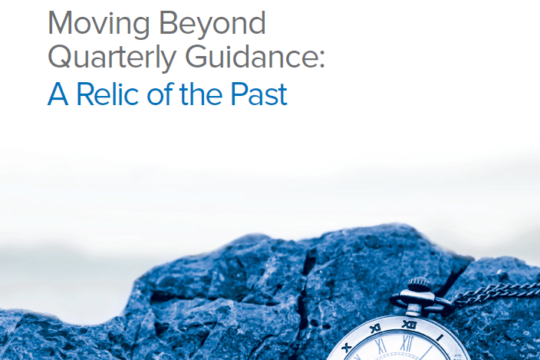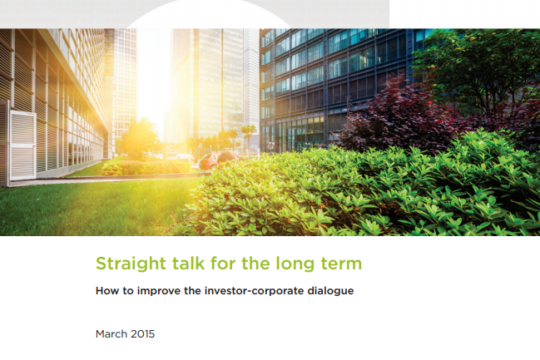Resources
We conduct original research on the causes of short-term business decisions and work to find practical solutions.

Investor-Corporate Engagement | Toolkit
21 February 2019 - Benefits of a long-term roadmap: Gives existing shareholders what they want Attracts long-term investors by using long-term language Acts as a deterrent or buffer against activist attacks More accurately shapes a company’s valuation Provides strategic clarity to internal audiences

Investor-Corporate Engagement | Article
9 October 2018 - A version of this post was first published on Harvard Law School Forum for Corporate Governance and Financial Regulation. Thank you to our Member organizations who contributed to the writing of this article. By now, most business-watchers have seen the president’s tweet asking the Securities and Exchange Commission (SEC) to study the requirement that US public companies release earnings quarterly. With this message, President Trump has focused attention on the short-term mentality that too often characterizes American business. The tweet, which followed his discussion with Pepsi CEO Indra Nooyi about...

Investor-Corporate Engagement | Article
1 August 2018 - Each stakeholder along the investment value chain must play a role in shifting to longer-term decision making. Today’s investment community, in large part, has become fixated on hitting immediate goals, losing sight of savers’ broader objectives in the process. An effective way for both companies and investors to correct this imbalance is to avoid short-term dialogue, including practices like offering and evaluating quarterly earnings guidance, and instead center their dialogue on strategies that build support for long-term growth. Building on our earlier work on the investor-corporate dialogue, FCLTGlobal...

Investor-Corporate Engagement | Article
13 April 2018 - Spring is in the air, baseball has begun here at FCLTGlobal headquarters in Boston, and the public company earnings reporting season is upon us – thus begins that familiar, yet often tedious, quarterly dance done by companies and the analysts that cover them. The quarterly earnings call looms large on most corporate calendars, regularly consuming significant amounts of time to prepare, but are investors and companies making the best use of this venue for regular interaction? Many of the most commonly asked questions on earnings conference...

Investor-Corporate Engagement | Press Release
24 October 2017 - Boston, MA, October 24, 2017– FCLTGlobal, a not-for-profit organization that works to encourage a longer-term focus in business and investment decision-making, today published a report, Moving Beyond Quarterly Guidance: A Relic of the Past, calling into question the need for quarterly guidance to shareholders and investors. The report debunks long-held industry misconceptions about the importance of short-term earnings guidance, and argues that companies and investors should move away from this practice. Key findings from the report show: Providing quarterly forward earnings guidance (as distinct from quarterly reporting) is increasingly on a downward...

Investor-Corporate Engagement | Report
23 October 2017 - Since 2005, research has consistently found that the vast majority of corporate executives think that short-term pressure is growing, that it is changing their business decisions, and that those changes are destroying value. One effective way that corporations are combating this phenomenon is by moving away from quarterly earnings per share (EPS) guidance and instead providing investors with a long-term road map focused on the fundamental economic drivers of the business tied to management’s outlook on critical key performance indicators (KPIs). As we highlighted in our...

Investor-Corporate Engagement | Report
16 March 2015 - Short-term behavior is becoming the norm in modern capital markets. Rather than pursuing and communicating long-term strategies, many public companies dedicate significant resources to meeting quarterly earnings guidance and communicating their performance relative to this guidance. This focus on short-term actions and communications seems counterproductive, considering that more than 50% of a typical company’s value is created by activities that will take place three or more years in the future. Research shows that the current emphasis on achieving short-term earnings targets leads to value destroying behaviours: One...